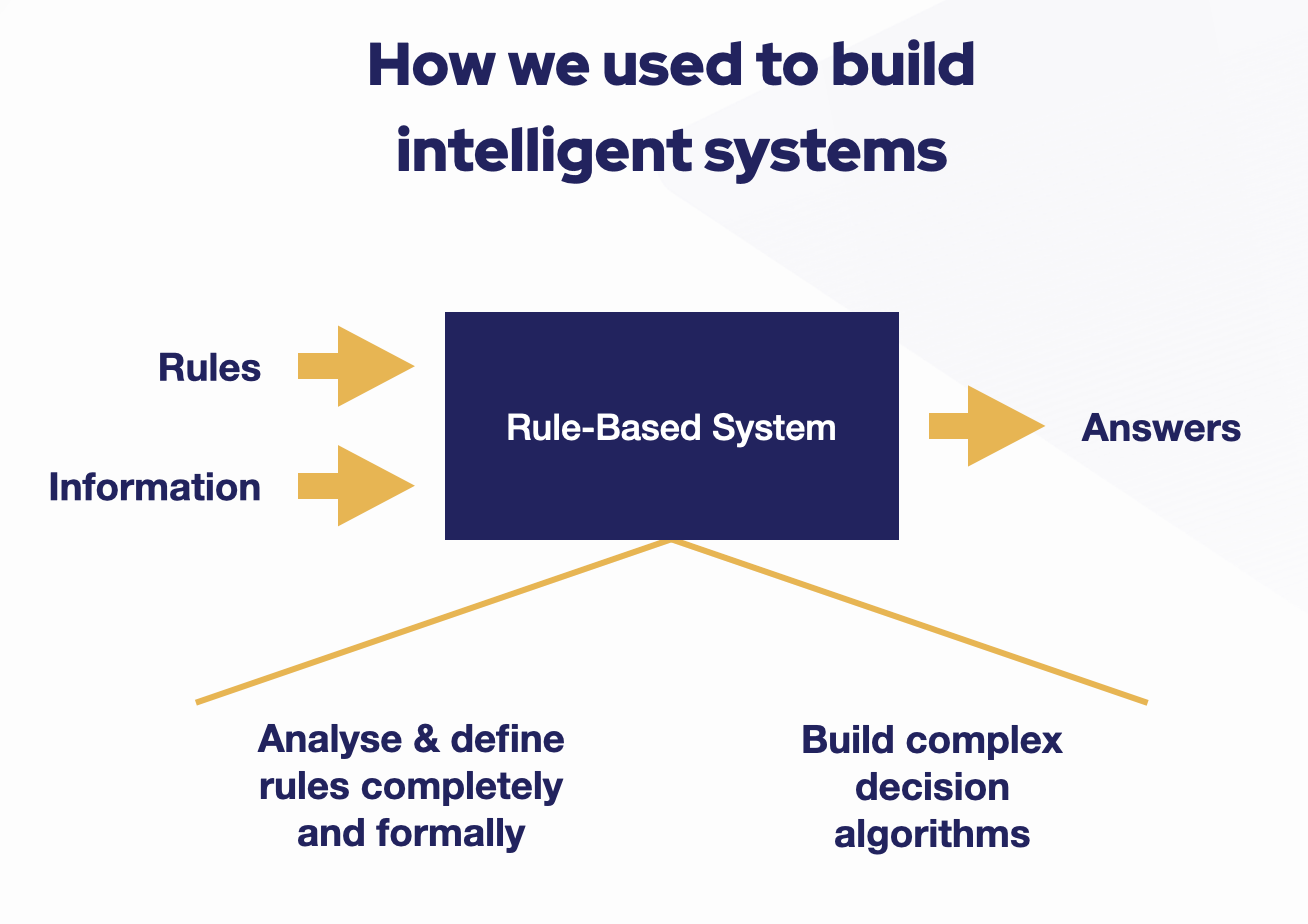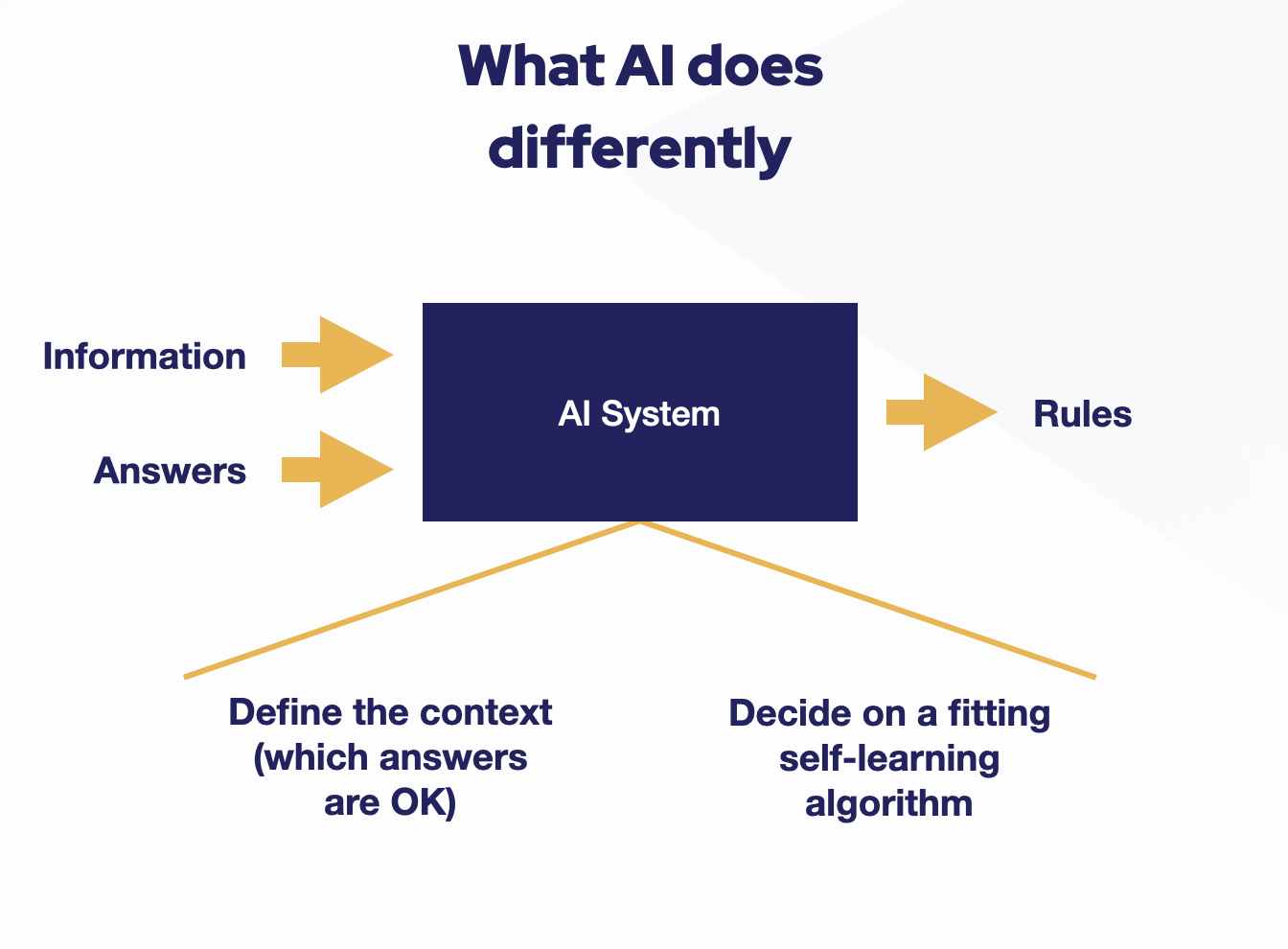We’re at a crossroads at which we are witnessing the potential of the latest technological innovations. The latest developments in the domain of Artificial Intelligence (AI) are transforming the world around us at a record-breaking pace. But what is AI? AI is not just another technology hype, but holds the potential to drastically change how we work. And that's just the effect of years of technological development nearing its full potential.
Let's dive in what is so fundamentally different about AI compared to the systems that we have been building and how it will affect your business.
How it started
In theory
For a very long time, people have been trying to create systems that could mimic human reasoning. The focus in the classical way of developing intelligent systems was on trying to model reality by identifying rules that could describe what happened if parameters would change.

We would then turn these rules into code, which formed the basis of many intelligent systems that we are still using today.
The next step? Provide the system with information, to which the system would apply these rules, resulting in expected answers, based on these rules.
In practice
For example, for building a weather prediction system, we would consult meteorologists to understand the rules on weather phenomena. Based on these rules, we tried to create weather forecasting systems that could predict the weather as accurately as possible. Whenever the system received new data, like current temperature or wind speed, it would apply these rules to forecast the weather.
However, this approach has inherent limitations:
- Complexity. As the application grows in complexity, so does the difficulty in identifying all the rules that need to be coded.
- Cost. Gathering domain experts to articulate rules is time-consuming and expensive. At the same time, the system is rigid once rules are coded. Any change in the external environment might lead to a costly redesign of the system.
- Restrictions. Sometimes it's impossible to work out all rules or take into account every variable that could affect an outcome.
How it's going
Recently with AI systems based on Machine Learning, we started doing things fundamentally different. Instead of trying to determine the rules by which a system should work ourselves, we switched things around completely.

We provide the system with a set of information and the corresponding answers and let the system learn about patterns in the provided input, which will be the basis to create new rules through machine learning.
Next, we provide this AI system with new information which results in us getting new answers.
The impact of AI systems
As we transition from rule-based systems to the more adaptable and intuitive frameworks provided by AI, we're opening up a world of unprecedented possibilities.
For people and society
For the average person, it's about more intuitive interfaces. Think of smart home systems that learn your preferences, recommendation engines that know your taste, and even health trackers that can predict a medical issue before it becomes critical.
On top of that, systems such as ChatGPT, Google Bard & friends have started to democratize the possibility for people to interact with AI systems. Recent advancements in the field of Natural Language Processing (NLP, a subset within the AI domain) has opened the doors for AI systems to better understand and generate human language. The key takeaway is that we no longer need specific technical skills to interact with AI systems. Our own natural language by speech or text is enough.
It creates a whole new world of possibilities. It has literally made interacting with computer systems child’s play.

For organizations
On the business front, the applications are just as transformative. Customer service chatbots are streamlining operations, predictive analytics are aiding in more accurate stock-level management, and advanced algorithms are assisting in making data-driven decisions more efficiently than ever.
Initially, AI was the domain of big tech giants who did a lot of pioneering work. Their groundbreaking efforts have translated into more affordable and readily accessible AI tools. Today, there is a large community of AI enthusiasts exchanging insights and resources on platforms like Hugging Face. Consequently, the path has been paved for smaller enterprises and even startups to start exploring how AI could be a game-changer for them.
So, what is AI and why should you look into its possibilities?
The rise of AI is creating new opportunities for both consumers and businesses, of all sizes. It has become increasingly user-friendly and cost-effective, making it a valuable asset for organizations to step up their innovation game.
In some following insights, we will explore ways to identify and evaluate possible AI applications for your business.
If you’re looking for guidance during your AI journey, just give us a shout!